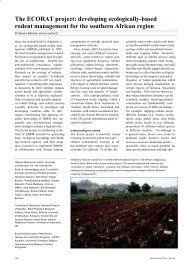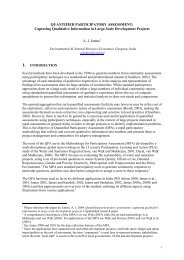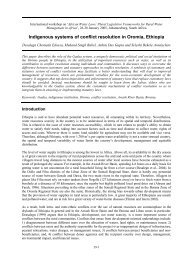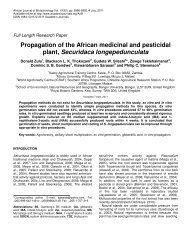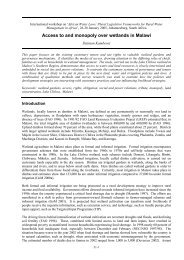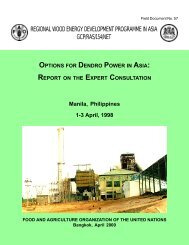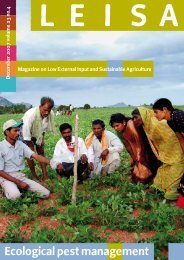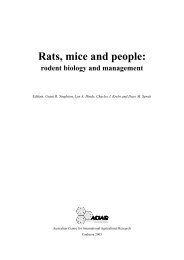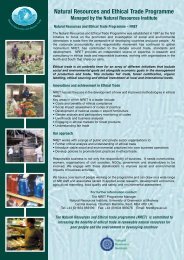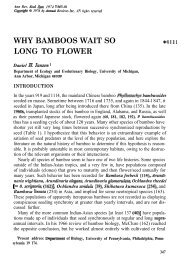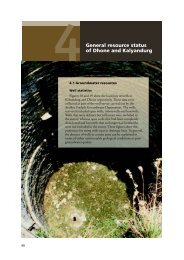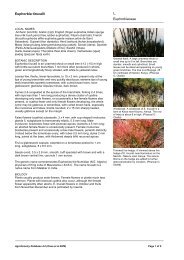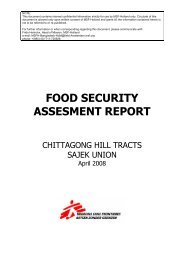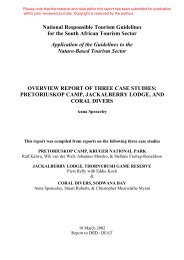Access to Rural Non-Farm Livelihoods - Natural Resources Institute
Access to Rural Non-Farm Livelihoods - Natural Resources Institute
Access to Rural Non-Farm Livelihoods - Natural Resources Institute
You also want an ePaper? Increase the reach of your titles
YUMPU automatically turns print PDFs into web optimized ePapers that Google loves.
The “very poor”, a small group (6% of households), were described as undertaking none of<br />
the IGAs listed, while the “poor”, the largest group (63%) were described as depending on<br />
paid farm labour, with men also ranking trade in fish, and women also ranking handicrafts as<br />
important. Households in the “average” group (23%) were described as undertaking all of the<br />
IGAs listed, except paid farm labouring and handicrafts, with trade in agricultural produce,<br />
and the rearing and selling of cattle and small lives<strong>to</strong>ck ranked most highly overall.<br />
Households in the “rich” group were described as undertaking trade in agricultural produce,<br />
shopkeeping, and rearing and selling cattle 101 .<br />
5.3 <strong>Non</strong>-farm IGAs<br />
Of the IGAs listed above, all except rearing and selling small lives<strong>to</strong>ck and cattle, growing<br />
and selling crops, paid farm labour and cattle herding can be classified as non-farm (non<br />
primary production) activities.<br />
5.3.1 Trade<br />
The shops owned by people living in Kitambuza are primarily in Lwentulege, but one has<br />
just opened in Kitambuza itself.<br />
Box 11. Mark Dona<strong>to</strong>, shopkeeper and trader<br />
Mark is 27 years old and has lived in the village since his parents came there from Ankole<br />
when he was just a baby. He and his wife, Mary, do not have any children of their own, but<br />
look after Mark’s seven year old brother Matthew. Mary farms, but most of the produce is<br />
consumed, so in 1998 Mark started trading coffee and beans during their respective seasons <strong>to</strong><br />
supplement their income. He copied friends who were traders, travelling by bicycle from farm<br />
<strong>to</strong> farm in Kitambuza and the neighbouring villages and then selling the produce on <strong>to</strong> other<br />
traders who come <strong>to</strong> Lwentulege from Kyotera. He opened his shop in Kitambuza in February<br />
2000, having got the idea when he saw that everyone was having <strong>to</strong> go down <strong>to</strong> Lwentulege <strong>to</strong><br />
buy even small household items, like soap and batteries, and everyday commodities, like salt,<br />
sugar, and maize flour. He raised the capital from farming and trading, and invested about<br />
1,500,000 shillings in having the shop (which is also their home) constructed and purchasing<br />
the initial s<strong>to</strong>ck. The s<strong>to</strong>ck comes from Kyotera – he brings it as far as Lwentulege in a taxi,<br />
and then up <strong>to</strong> Kitambuza on his bicycle. He goes <strong>to</strong> Kyotera once a fortnight, and spends<br />
about 150,000 shillings. Problems are limited working capital due the high costs of<br />
constructing the shop (he hired two professional builders from Dwaniro), which means that he<br />
can not always s<strong>to</strong>ck enough of the more popular items, and people taking goods on credit and<br />
then failing <strong>to</strong> pay. He is thinking about s<strong>to</strong>pping serving those with outstanding debts. He is<br />
continuing with the trading business in season – during the bean season in April and May,<br />
Mary helps with the shop, but during the coffee season he shuts it completely. He would like<br />
<strong>to</strong> expand the shop, but worries about security if he were <strong>to</strong> have a lot more s<strong>to</strong>ck on the<br />
premises. Both security and the number of cus<strong>to</strong>mers would be better in Lwentulege, and if he<br />
gets enough capital he might move the business there. He and Mary have also just bought two<br />
piglets and are building a pigsty for them – he thinks raising pigs will complement the<br />
shopkeeping and the trading, but the shop comes first. He only went up <strong>to</strong> P5 and never had<br />
any business training – he would like <strong>to</strong> get some, but has never had the money.<br />
As identified in the group meeting, traders are some of the more prosperous individuals in the<br />
village.<br />
101 See Appendix 12 for details.<br />
51



